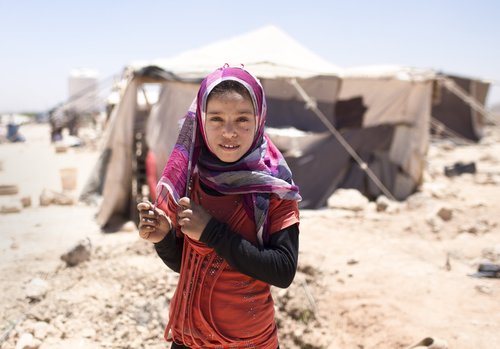The Refugee Crisis and Ensuring Access to Education in Jordan


Country Liaison for Jordan, Omayya Al-Hassan, shares with us the impact of the Syrian refugee crisis on Jordan’s education system for all children and how the recent funding crisis of the United Nations Relief and Works Agency (UNRWA) will have a devastating impact on the education of Palestinian refugees living in Jordan. She also shares with us news about the Laureates and Leaders for Children Summit, and the efforts being made to ensure all children have access to quality education throughout all levels of education.
Challenges Facing Jordan’s Education Services
Jordan has recently faced and is still facing the influx of Syrian refugees, which has resulted in a significant increase in the demand for schooling. The Syrian crisis has added a large burden on the education services provided by the Ministry of Education in terms of maintaining the quality of education and delivery of services to all children all over the country. In response to this crisis, the international community supported Jordan and worked with the government to ease the pressures associated with getting Syrian refugee children to schools.
Jordan will face consequences of the financial crisis being experienced by the United Nations Relief and Works Agency (UNRWA) after the U.S. Department of State decided to withhold millions of aid dollars. Failure to make up the funding gap will affect the services offered to Palestinian refugees in Jordan, particularly children. UNRWA launched an unprecedented global fundraising campaign to reach out to a broad range of governmental donors, the private sector, foundations, charities, and individuals. Jordan, with Sweden and Egypt, co-organized a summit in Rome on 15 March to discuss the financial crisis confronting the UNRWA. More than 90 countries were invited to participate in the Rome conference, which was attended by the UN Secretary-General, and the European Union’s foreign policy chief. The conference has gathered pledges of $100 million in funding, according to UN officials. (For more information, please see https://www.unrwa.org)
Laureates and Leaders for Children Summit 2018
Under the patronage of His Majesty King Abdullah II, Jordan hosted the second Laureates and Leaders for Children Summit 2018, which took place on March 26-27 at the King Hussein Bin Talal Convention Centre at the Dead Sea. The summit brought together Nobel laureates, global leaders, and youth from around the world to inspire, collaborate, and act to protect the most vulnerable children.
The summit was launched in 2016 by Nobel Peace Laureate Kailash Satyarthi to lay the foundation for a more sustainable and forward-thinking leadership to safeguard the future of the world’s children, particularly in the face of global challenges and chronic social challenges impacting communities worldwide. The first summit was hosted by Indian President Pranab Mukherjee.
Advancing Early Childhood Education Opportunities for All
In November 2017, the National Council for Family Affairs held a workshop that discussed the daycare centers draft bylaw. The workshop highlighted the importance of setting standards that apply to all daycare centers in all sectors (public, private, or voluntary); allowing room to follow-up on decisions regarding the closing down of nurseries that have violated regulations; and addressing the issue of integrating children with disabilities.
On July 2017, the Ministry of Education and UNICEF launched an eight-year executive plan (2017-2025) aimed at “universalizing access” to pre-primary education in the Kingdom. The Jordanian government is keen to invest in early education and looks forward to continuing collaboration with UNICEF, with support from donors, civil society, and the private sector, to universalize access to pre-primary education in Jordan. The plan aims to allow all children to access pre-primary education, with a focus on a stronger policy agenda and country-wide coverage of early childhood education, through a combination of capacity building, expansion of physical spaces, and support for service delivery. It also emphasizes the importance of strengthening partnerships with communities and the private sector in the nationwide expansion of kindergartens.
The National Strategy for Human Resource Development 2016-2025, which was launched in September 2016, supports the Sustainable Development Goal 4 in relation to child development and education for children and youth. The objectives of the Human Resource Development strategy are: